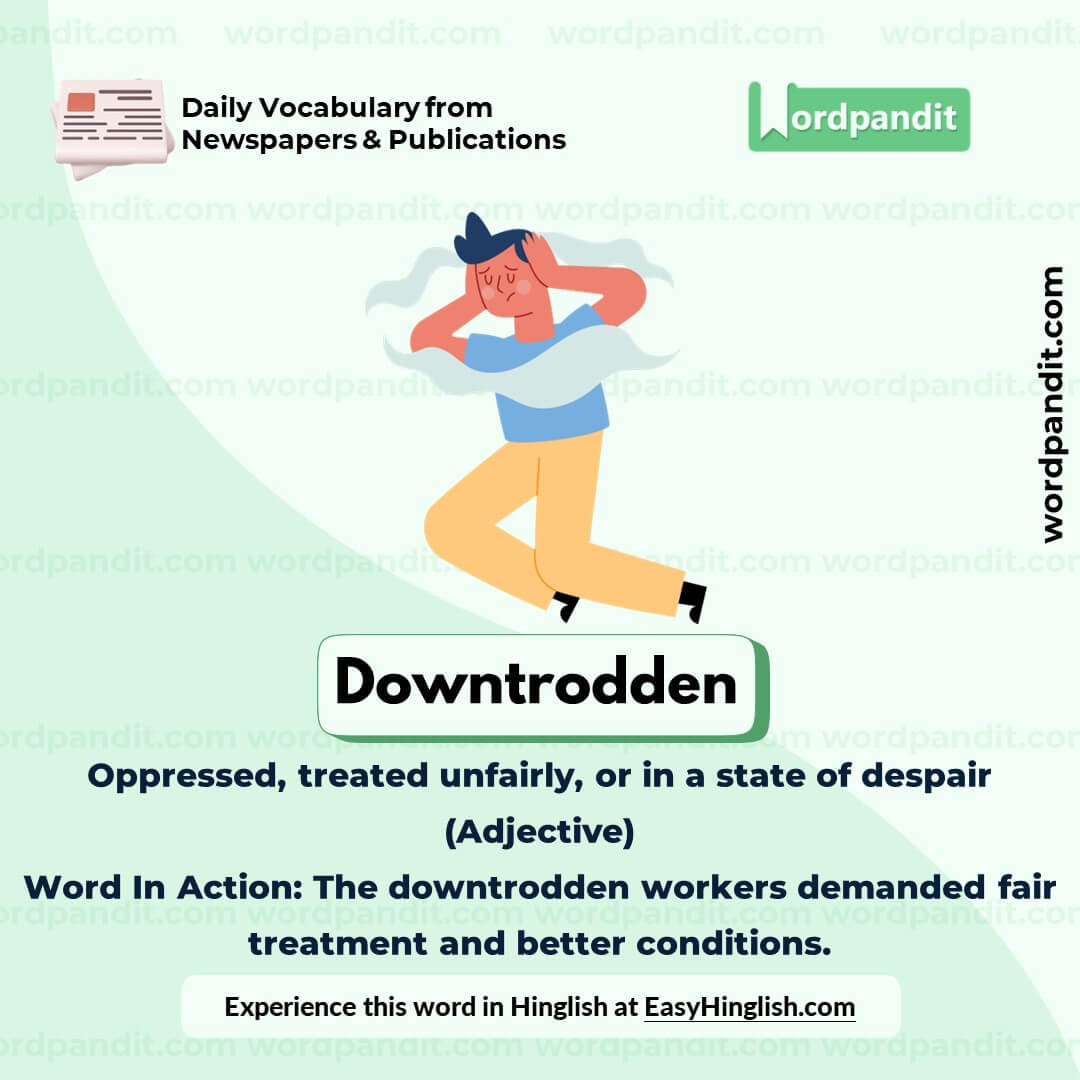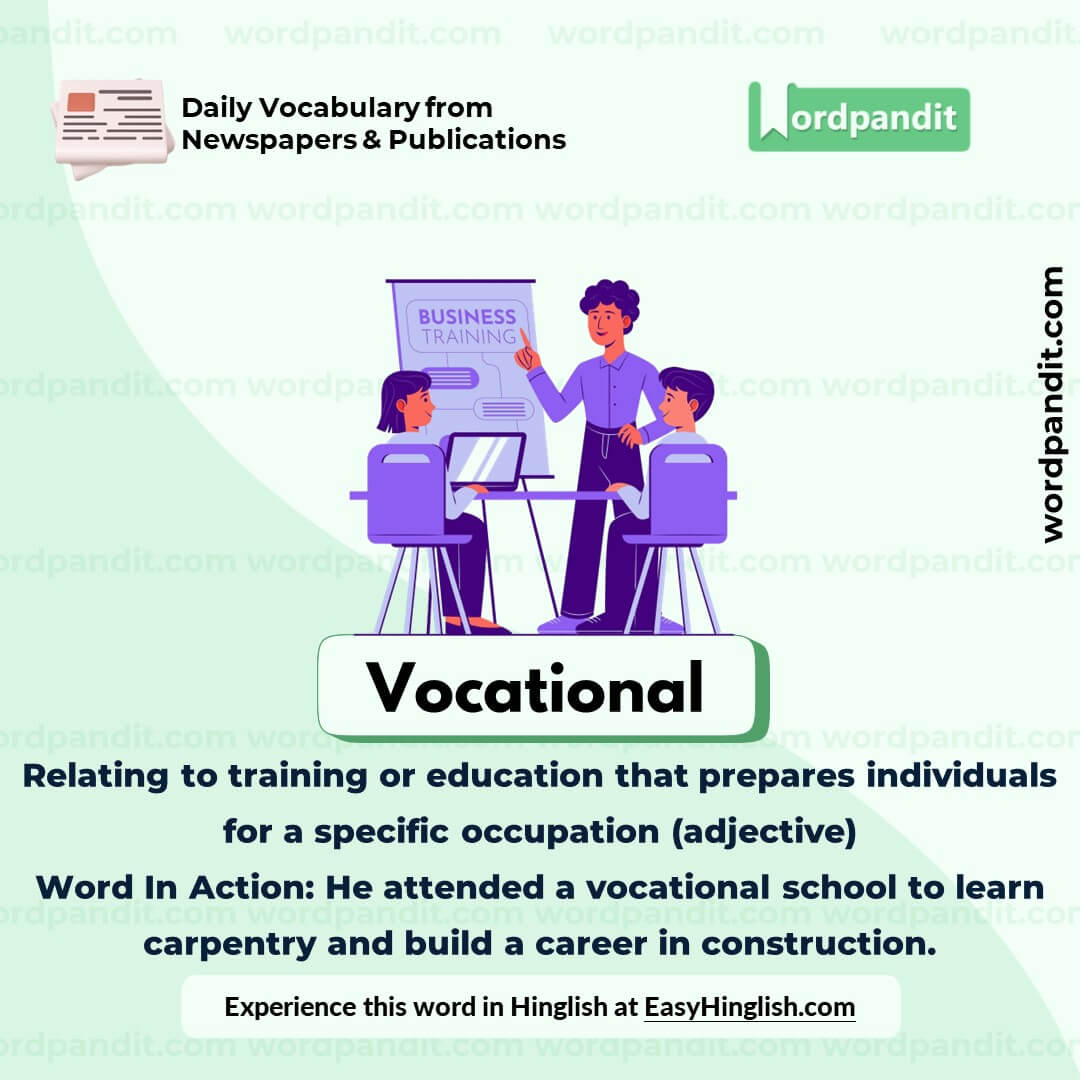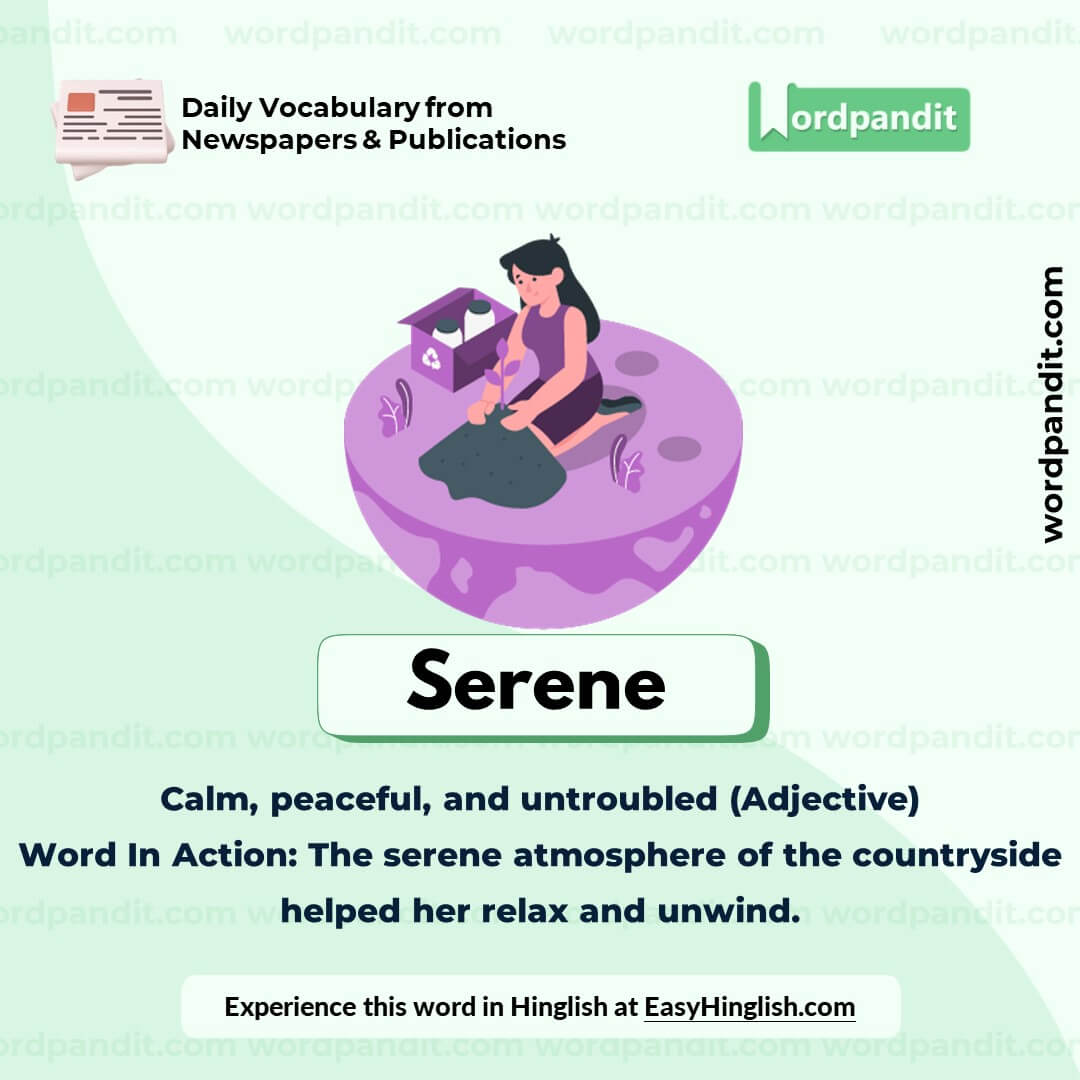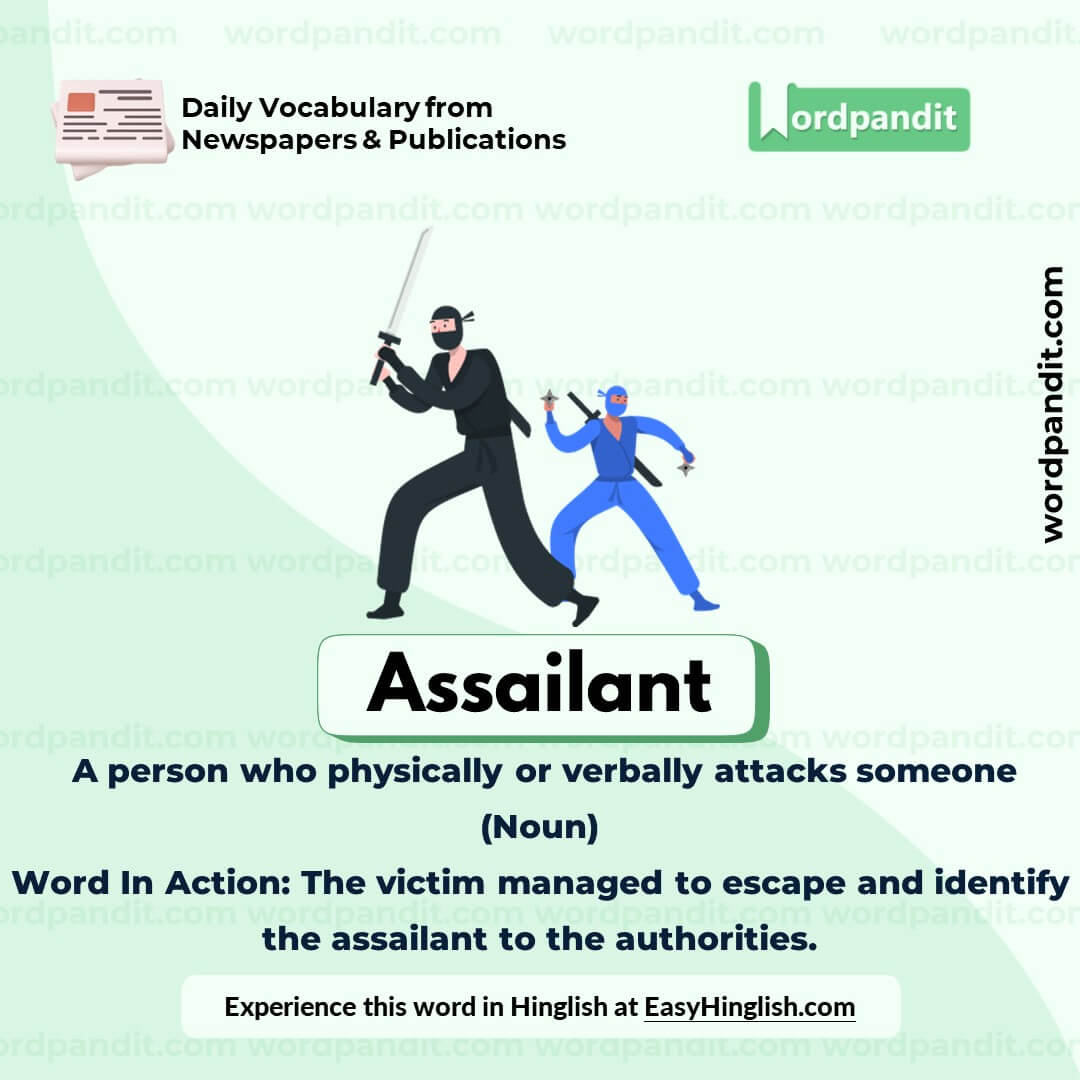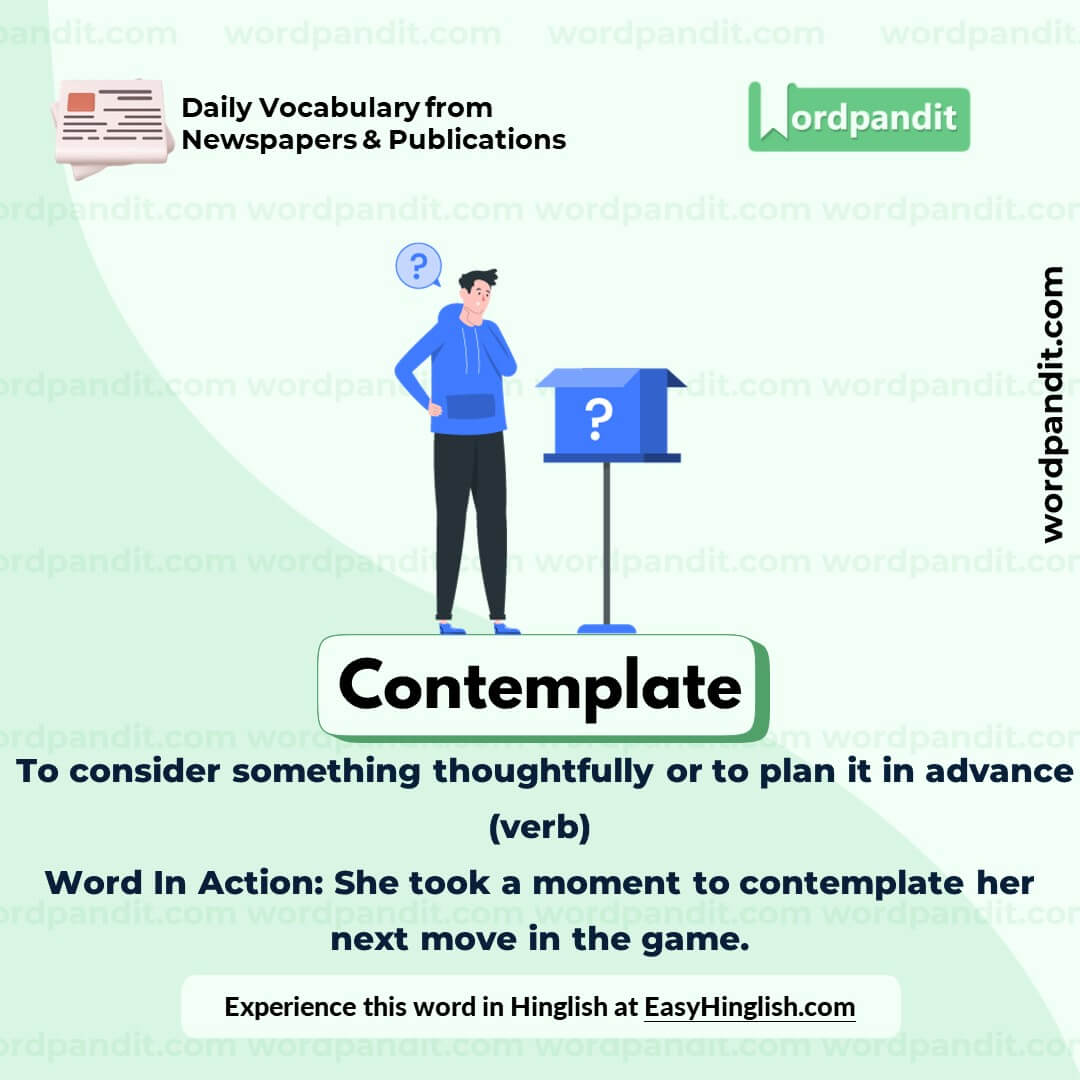Daily Vocabulary from Indian Newspapers and Publications
Welcome to Wordpandit’s Indian Vocabulary Hub
At Wordpandit, we understand the importance of staying rooted in the local context while expanding your language skills. This section focuses on enriching your vocabulary with words and phrases drawn from India’s leading newspapers and publications, ensuring you're learning vocabulary that is practical, relevant, and uniquely Indian.
Why Indian Sources Matter
We believe that the best way to master any language is by immersing yourself in local content. That’s why we carefully curate vocabulary from top Indian publications, including:
- The Hindu
- The Times of India
- The Economic Times
- Hindustan Times
- Live Mint
- The Indian Express
- And many others...
Stay Updated, Stay Relevant
With daily updates from Indian news sources, you’ll be consistently learning words that reflect the trends and shifts in Indian society and culture. Our focus is to provide vocabulary that enhances your understanding of the language in an Indian context.
How Wordpandit Supports Your Goals
Whether you’re preparing for exams, aiming to improve your professional communication, or simply want to stay connected with the latest Indian vocabulary, Wordpandit is here to guide you every step of the way.
Learn with a Practical Approach
Our interactive learning methodology includes real-world examples, engaging activities, and context-specific usage to ensure that every word becomes part of your active vocabulary.
Dive into Indian Vocabulary Today!
Why Choose Wordpandit?
Practical Learning: Focus on words you'll actually encounter in real-world reading, enhancing your comprehension and communication skills.
Diverse Content: From current affairs to scientific breakthroughs, our varied sources expose you to vocabulary across multiple domains.
Effortless Integration: Make Wordpandit a part of your daily routine. Just a few minutes each day can significantly boost your lexicon over time.
Your Path to Vocabulary Mastery
- Visit our Daily Vocabulary section regularly
- Explore new words and their usage in context
- Practice incorporating these words into your own writing and speech
- Track your progress as your vocabulary expands
Start Your Journey Today
Embark on your vocabulary enhancement journey with Wordpandit. By consistently engaging with our daily posts, you'll build a robust vocabulary that serves you well in academic, professional, and personal contexts.
Remember, a word a day keeps linguistic limitations at bay. Make Wordpandit your daily companion in the quest for vocabulary excellence!
WORD-1: Downtrodden
Context:
"The angry and downtrodden turn their knives on those even weaker, said one netizen." - The Telegraph India
Explanatory Paragraph:
The word "downtrodden" describes individuals or groups who are oppressed, treated harshly, or suffering under difficult circumstances. It is often used to highlight social or emotional struggles caused by external forces such as poverty, discrimination, or injustice.
Meaning: Oppressed, treated unfairly, or in a state of despair (Adjective)
Pronunciation: doun-trod-en
Difficulty Level: ⭐⭐ Beginner
Etymology: Derived from Old English "dun" (down) and "tredan" (to tread), meaning "to be trampled down."
Synonyms & Antonyms:
Synonyms: Oppressed, subjugated, exploited, distressed
Antonyms: Empowered, privileged, free, liberated
Usage Examples:
- The downtrodden workers rallied for better wages and improved conditions.
- Her foundation focuses on uplifting the downtrodden in underserved communities.
- The downtrodden villagers found hope in the new social reform programs.
- Literature often portrays the downtrodden as symbols of resilience and hope.
Cultural Reference:
"Give me your tired, your poor, your huddled masses yearning to breathe free..." - A line from the poem inscribed on the Statue of Liberty that resonates with the plight of the downtrodden.
Think About It:
How can society ensure that the voices of the downtrodden are heard and acted upon?
Quick Activity:
Write a short story featuring a downtrodden character who overcomes their challenges through resilience and help from others.
Memory Tip:
Picture someone literally being "trodden down" by heavy boots to connect with the word’s meaning of oppression and hardship.
Real-World Application:
The term "downtrodden" is frequently used in discussions about social justice, charity work, and storytelling to describe those in need of help and advocacy.
WORD-2: Vocational
Context:
"Not much is known about the perpetrators of the two mass attacks that followed the Zhuhai incident. In the first, eight people died in a stabbing spree at a vocational institute." - The Telegraph India
Explanatory Paragraph:
The word "vocational" relates to education, training, or skills aimed at preparing individuals for a specific job or career. Vocational institutes focus on teaching practical and technical skills that enable students to enter the workforce directly in a particular trade or industry.
Meaning: Relating to training or education that prepares individuals for a specific occupation (adjective).
Pronunciation: voh-KAY-shuh-nuhl
Difficulty Level: ⭐⭐ Beginner
Etymology: Derived from the Latin word "vocatio," meaning "calling" or "summons," and the suffix "-al," indicating relation.
Synonyms & Antonyms:
Synonyms: Occupational, professional, trade-related, technical
Antonyms: Academic, theoretical, general
Usage Examples:
- The government has introduced several vocational training programs to boost youth employment.
- She attended a vocational school to become a certified electrician.
- Vocational courses offer practical skills that are highly valued in the job market.
- Many high schools now integrate vocational education with traditional academic studies.
Cultural Reference:
"Vocational education is often seen as a pathway to skilled trades, empowering individuals to contribute directly to economic development." - United Nations Educational, Scientific and Cultural Organization (UNESCO)
Think About It:
How do you think vocational education can bridge the gap between unemployment and industry-specific skill shortages?
Quick Activity:
List five vocational careers and the skills needed for each. Then, identify which vocational institute in your area offers training for one of these careers.
Memory Tip:
Think of "vocation" as a "calling" to a job, and "vocational" as the training that answers that calling.
Real-World Application:
Vocational training is essential in fields like healthcare, technology, construction, and manufacturing, where specialized skills are critical for success.
WORD-3: Serene
Context:
"Such violence is new to this beautiful and serene coastal city." - The Telegraph India
Explanatory Paragraph:
The word "serene" describes a state of calmness, peace, and tranquility. It is often used to characterize environments, people, or moments that evoke a sense of quiet harmony, free from disturbance or stress.
Meaning: Calm, peaceful, and untroubled (Adjective)
Pronunciation: suh-reen
Difficulty Level: ⭐⭐ Beginner to Intermediate
Etymology: Originating from Latin "serenus," meaning clear, unclouded, or calm.
Synonyms & Antonyms:
Synonyms: Tranquil, peaceful, placid, composed
Antonyms: Turbulent, agitated, chaotic, disturbed
Usage Examples:
- The serene waters of the lake mirrored the vibrant colors of the sunset.
- She had a serene demeanor even in the face of adversity.
- The spa offered a serene environment ideal for relaxation.
- We spent a serene evening by the fireplace, listening to soft music.
Cultural Reference:
"Serene" often appears in literature to describe idyllic scenes or characters. For example, Wordsworth’s poetry often captures serene natural landscapes that inspire peace and reflection.
Think About It:
What personal qualities can help someone maintain a serene state of mind during challenging times?
Quick Activity:
Write a short paragraph describing a place that makes you feel serene. Use vivid adjectives and imagery to convey the feeling.
Memory Tip:
Think of the word "serene" as related to "serenity," like the calmness of a serene lake or a peaceful starry sky.
Real-World Application:
"Serene" is often used in travel advertisements, wellness programs, and mindfulness practices to evoke a sense of peace and calm that appeals to people seeking relaxation.
WORD-4: Assailant
Context:
"The only information put out was that the assailant was angry because the institute had refused to give him a passing out certificate." - The Telegraph India
Explanatory Paragraph:
An "assailant" is a person who attacks someone physically or verbally. The term is often used in contexts involving crime, conflict, or confrontation to describe the aggressor or perpetrator of an assault.
Meaning: A person who physically or verbally attacks someone (Noun)
Pronunciation: uh-say-luhnt
Difficulty Level: ⭐⭐⭐ Intermediate
Etymology: From Old French "assailant," derived from the Latin "assilire," meaning "to leap upon" or "attack."
Synonyms & Antonyms:
Synonyms: Attacker, aggressor, antagonist, invader
Antonyms: Defender, victim, ally, protector
Usage Examples:
- The police arrested the assailant shortly after the attack.
- The victim courageously confronted the assailant in court.
- Security cameras captured the assailant entering the building moments before the incident.
- Despite their injuries, they provided a detailed description of the assailant to the authorities.
Cultural Reference:
The term "assailant" frequently appears in news headlines, particularly in crime reports, highlighting its use in conveying seriousness and urgency in such contexts.
Think About It:
What factors might lead someone to become an assailant, and how can society address such root causes?
Quick Activity:
Write a dialogue where a witness describes an assailant to the police. Use descriptive language to convey the scene vividly.
Memory Tip:
Remember "assailant" by associating it with "assault," as both words share the same root and relate to attacks or aggressive acts.
Real-World Application:
"Assailant" is a critical term in criminal investigations, journalism, and storytelling, where identifying the attacker is central to the narrative or case resolution.
WORD-5: Contemplate
Context:
"Communist Party spokesmen turned to talking about strict and swift punishments; a ‘crowd mood monitoring’ is being contemplated." - The Telegraph India
Explanatory Paragraph:
The word "contemplate" means to think deeply or carefully about something. It often implies a period of reflection or consideration before making a decision or taking action. The term is also used to express imagining potential outcomes or scenarios.
Meaning: To consider something thoughtfully or to plan it in advance (verb).
Pronunciation: KON-tem-plate
Difficulty Level: ⭐⭐⭐ Intermediate
Etymology: Derived from the Latin "contemplari," meaning "to gaze at or observe," which is rooted in "templum," referring to a space for observation.
Synonyms & Antonyms:
Synonyms: Consider, ponder, reflect, deliberate, meditate
Antonyms: Ignore, dismiss, disregard
Usage Examples:
- She spent hours contemplating the next step in her career.
- The committee is contemplating significant changes to the school curriculum.
- Before making a final decision, they contemplated all possible outcomes.
- He often contemplates the meaning of life during his morning walks.
Cultural Reference:
"To contemplate is to look at shadows. When you contemplate, you are gazing upon the things that cast shadows." - Augustine of Hippo
Think About It:
Do you believe contemplation always leads to better decisions, or can overthinking sometimes hinder progress?
Quick Activity:
Take five minutes to contemplate a personal goal you want to achieve this year. Write down three actions you can take to make progress.
Memory Tip:
Break "contemplate" into "con" (together) and "template" (a guide), imagining that contemplation involves gathering thoughts to form a guide for action.
Real-World Application:
Contemplation is vital in decision-making processes, especially in business, politics, and personal development, where considering all angles is crucial for success.


